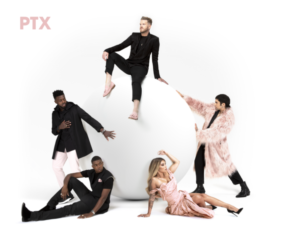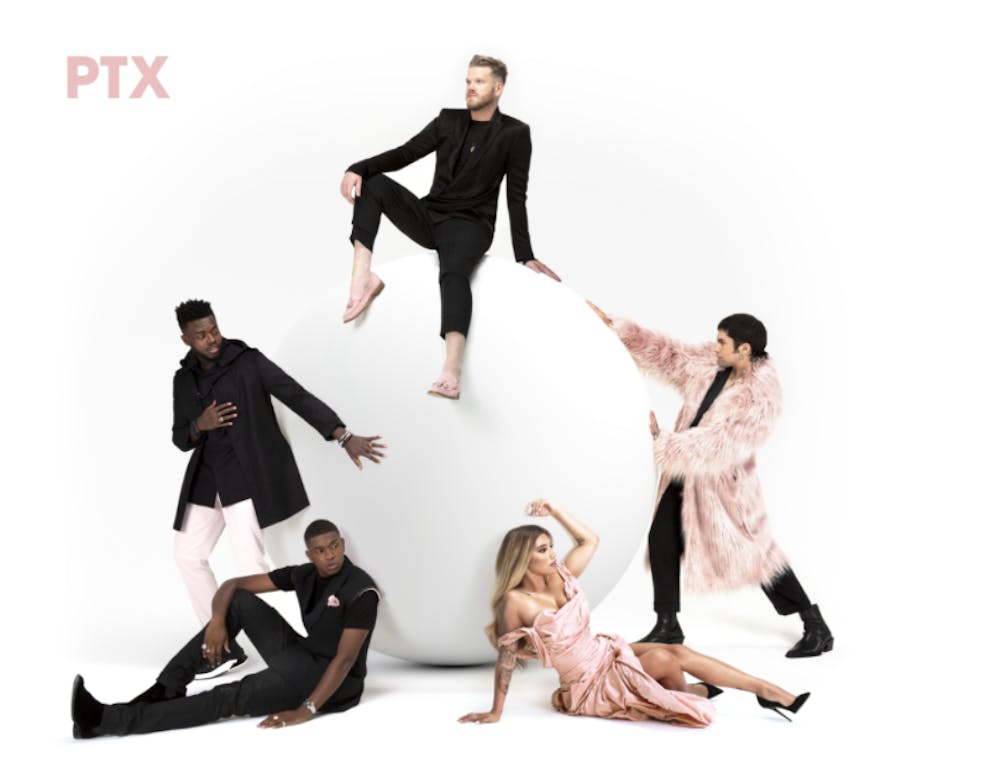By Jayleen Rolon
Staff Writer
Five years after the release of their first original album, Pentatonix, the five-member sensational pop acapella group — known for their creative covers of popular songs and their five holiday albums — released their newest album, “The Lucky Ones” on Feb. 12. This 11-track album was two years in the making, said Scott Hoying, the baritone, in a celebratory Instagram post.
“The Lucky Ones” is a diverse pop album that tackles the effects of mental health in relationships in a blend of catchy pop anthems and soft ballads.
Coming in hot with “Happy Now,” an upbeat single released last summer, Hoying sings about moving on happily after a breakup as the other members of the group harmonize with him and beatboxer, Kevin Olusola, provides a catchy beat emphasized by hand percussion. The song revolves around the question “Am I happy now, right now / With or without you?” that acts as an emotional check in following a breakup.
In the more lively song “Love Me When I Don’t,” the group discusses the grounding support system that a partner can provide when one is mentally unstable. “You always pull back the waves when they're getting high,” sings tenor Mitch Grassi, referencing the overwhelming nature of mental health struggles and expressing gratitude for the aforementioned support system. This memorable love song also references the withdrawal common with those struggling with depression. In the chorus, mezzo-soprano Kirstin Maldonado sings, “When I'm not okay / I push you away,” immediately following up with “But you pull me close,” reinforcing the message of supporting your loved one’s mental lows.
Continuing the focus on nurturing the mental health of a significant other, “Coffee in Bed” is primarily from the perspective of the partner doing the nurturing, unlike “Love Me When I Don’t.” The uplifting lyrics belted out by Grassi, “When you get too in your head / I'll bring you coffee in bed,” backed by an impressive performance from bass Matt Sallee, accompanied by Olusola’s beatboxing, all provide support for a partner who can’t get out of bed due to depression.
“Be My Eyes,” another single released last fall, yet again expresses gratitude for a person who provides guidance during a difficult time with mental health. Maldonado, who wrote the piece and sang the lead, uses the analogy of losing your vision and having someone use their own eyes to guide you, emphasizing the disorientation of impaired vision and therefore mental instability. “Be my eyes, be my eyes / When I can't see” is repeated infectiously alongside an energetic melody.
The desire for separation from an unhealthy relationship is detailed in “A Little Space.” The lyrics describe a relationship that became intense quickly that resulted in the speaker wanting to take a step back to evaluate the situation, exemplified by the chorus’ lyrics, “I know I wanted a taste but my senses came back / Now I know I'ma need a little space.” The unhealthy nature of the relationship is emphasized by Sallee’s “I love you in a messed up way,” sung over an ironically upbeat harmony.
A sharp change in tone is evident in the soft ballad “Side,” as Grassi questions why the relationship’s dynamic has changed in a way that feels counterproductive. The heartbreaking lyrics of betrayal, “Used to be on my side / Now you're not on my side,” capture the feeling of a shift in loyalty that happens when a couple starts to argue constantly.

The energy is heightened again with “Bored,” which describes the feeling of simply wanting to be in someone’s company without necessarily doing anything. “When we are, when we are side by side I don't need my vices'' the chorus blares, emphasizing the abandonment of unhealthy behavior due to infatuation.
“Exit Signs” brings yet another abrupt shift as it gently details a sporadic on-again, off-again relationship. In this sentimental ballad Maldonado asks her fickle partner to stay instead of continuing the cycle of breakup and make up, singing, “But maybe you should stay this time / And see it out / For always.”
Circling back to the discussion about mental health in a different way, “Never Gonna Cry Again,” a track with heavy bass elements created by Sallee and Olusola, deals with the role of social media on mental health. “I sold my soul / I'm a shell of it,” sings Grassi, referencing the act of selling your soul for fame, swiftly following that with “Cause if everybody loves me / Then I'm never gonna cry again.” The song takes the standpoint of using validation from others as a coping mechanism, which is interesting coming from a group with nearly 19 million YouTube subscribers.
“It’s Different Now,” a powerful ballad that uses piano accompaniment, is a heartfelt expression of coming to terms with the reality of needing to leave a relationship. “I've been holding my breath / Cause I don't want to be let down / But we're too far for that now,” sings Maldonado in this somber moment of clarity that abandons the denial of the previous track.
Ending with “The Lucky Ones,” the album comes full circle in an emotional ballad that reflects on a mental health journey. The journey starts with “Don’t stand out, you'll get kicked around / Put up a wall so tall, you're safe there” and ultimately leads to “Look how far we’ve come.” The journey is not one from rock bottom to perfection; it is mere progress in coping with the highs and lows of life.
Pentatonix’s “The Lucky Ones” is an emotional rollercoaster that mimics the volatility of mental health and the role it has in relationships. From radio worthy hits like “Love Me When I Don’t” to heart-wrenching ballads like “Exit Signs,” it offers a range of sounds that provide many angles to the impact mental illness can have on a relationship, a journey that is reflected on in “The Lucky Ones.” This peculiar blend of an upbeat genre and a taboo, this too-often stigmatized topic is both relatable and aesthetically pleasing, making it an unforgettable experience. Whether you’re already a Pentaholic or not, this is an album that will leave you in awe.







